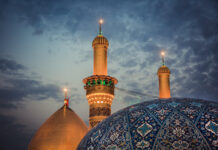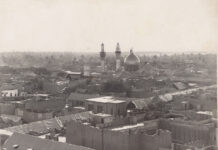Most practicing Muslims have heard numerous ahādith and āyāt about the Qurʾan as a “manifest light,” “an exhortation,” “a cure,” “a mercy,” “a guide,” and something “that has no doubt.”[1]The characteristics mentioned in this sentence have been mentioned numerous times in various āyāt of the Qurʾan and aḥādīth. For example, see: Qurʾan, an-Nisāʾ (4):174; Yūnus (10):57; and al-Baqarah (2):2. However, many contemporary Muslims disagree. Undeniably confused by the Qurʾan, it is difficult to come to terms with the reality of their own confusion and the fact that the Divine has noted the Qur’an as clear. Why is it not easy? In the age of information, understanding the Qurʾan has remained elusive and at arms-length despite almost every secular science available to us literally at our finger-tips. This confusion persists even with numerous attempts to study the Qurʾan. To this aim, we devour all exegetical literature within reach—including those available on YouTube—and furiously google the difficult verses of the Qurʾan (so much so that Google can predict them). This confusion frustrates post-modern millennial Muslims in particular, who seek instant answers to often complex intellectual problems.
In this piece, I attempt to respond to this problem by applying the analysis of Ayatullah Jawādī Āmulī in his topical tafsīr, The Qurʾan in the Light of the Qurʾan, primarily its fifth chapter, “Understanding the Qurʾan.”[2]Ayatullah Jawādī Āmulī, On the Journey Towards Understanding the Qurʾan, trans. Rizwan Rashid (Canada: ISRA Publications Corp., 2018). This particular chapter has been translated into English by Shaykh Rizwan Rashid and recently published in the book, On the Journey Towards Understanding the Qur’ān. Although Ayatullah Jawādī Amulī does not address this problem directly in this book, the general solutions he provides so eloquently can have profound benefits when applied to our modern context. Before we address the problem directly, it is important to explore a few of Ayatullah Jawādī’s foundational discussions on the fiṭrah and on the nature of the language of the Qurʾan.
One of Ayatullah Jawādī’s main contentions is that the language of the Qurʾan is the language of the fiṭrah. The fiṭrah, from the root fa-ṭa-ra (he created, originated, molded), can perhaps best be translated as man’s divinely-originated constitution or innate disposition. He posits that although the Qurʾan is in Arabic, and was revealed in a certain context, it presents a message for all of humanity, and in turn, eternally relevant: “Being a part of another culture or civilization does not make the secrets of the Qurʾan inaccessible and does not prevent one from benefiting from its intricacies.”[3]Āmulī, On the Journey Towards Understanding the Qurʾan, trans. Rizwan Rashid, 1. As such, he poignantly notes that the Qurʾanic message must supersede linguistic and cultural barriers, and that “being an Arab is not a requirement for accessing the truths of the Qurʾan nor is being a non-Arab a barrier in reaching the treasures of its teachings.” If an understanding of the Qurʾan were limited to Arabs and the historical context in which it was first revealed, then an understanding of the Qurʾan would be inaccessible to most, rendering its guidance exclusive to a particular group of people. Insofar as it is not limited in this way, the Qurʾan can be “the warner for all the worlds and the guide for all mankind” (emphasis added). Accordingly, “it is the human fiṭrah (man’s innate and divinely-originated disposition) which is in touch with the lingua franca of the Qurʾan…”[4]Ibid. We are all innately capable of understanding the Qurʾan.
“It is the human fiṭrah (man’s innate and divinely-originated disposition) which is in touch with the lingua franca of the Qurʾan…” We are all innately capable of understanding the Qurʾan.
He continues,
No one should use language—unfamiliarity to it or unclarity of it—as an excuse for not embarking on the path of ascension. They should not consider it as a thorn on their path nor lose hope because of it from traversing the road to felicity. The only language that harmonizes the vastness of mankind is the language of the fiṭrah—i.e., man’s common culture. It is the fiṭrah that is acquainted with God, and the Creator of the world has ensured its preservation and constancy for all humanity throughout history.[5]Ibid. This sentence is referring to Qurʾan, ar-Rūm (30):30.
When the language of the Qurʾan is the language of human nature, why then is the Qurʾan confusing to so many? Ayatullah Jawādī states two possible reasons for this doubt and confusion: The first is rooted in “the matter itself—i.e. the matter is deficient, weak, or false, thereby leading to the formation of doubt in a person.”[6]Āmulī, On the Journey Towards Understanding the Qurʾan, trans. Rizwan Rashid, 11. The second possibility is located in the one who doubts, where “the doubter himself has a weakness or deficiency. In this latter case, the doubt stems from the doubter himself and not from what he is in doubt about.”[7]Ibid. Take for example, a person with perfect vision attempting to drive a car with an extremely dirty windshield. Looking out of her windshield, she would find the roads in front of her unclear and difficult to see. This is not because the world outside of the car is blurry; rather, it is because she did not clean the windshield. If this person is confused and incapable of driving, it is not because of a deficiency in knowledge, rather it is due to her own ignorance and inability to drive with a dirty windshield.
So, we need to ask ourselves: Which of the two possibilities holds true when it comes to our confusion when reading the Qurʾan? Is it because the Qurʾan (astaghfirullāh) is flawed? Or is it because we are flawed? If the latter, then how are we flawed, and how do we fix our “selves”? What are we doing wrong that we have rendered ourselves incapable of understanding the Qurʾan? According to Ayatullah Jawādī, the Qurʾan presents the following solution:
The Qurʾānic perspective is this: If the illuminated lantern of man’s inner being—which is none other than his intellect and fiṭrah—is extinguished due to the effects of sins, faithlessness, and hypocrisy, then he will be blind-hearted. And if the inner being of someone becomes blind, he will not have the power to differentiate between truth and falsehood. When this happens, he will not be able to perceive the difference between the Words of God and the words of man. Therefore, just as he doubts the words of man, he will also doubt the Words of God:
Do they comprehend the knowledge of the Hereafter? No, they are in doubt about it. Rather, they are blind to it. (Qurʾan, an-Naml (27):66)
Such unbelievers have been afflicted with blindness, and for this very reason, they have doubts regarding the Oneness of God, Resurrection, or divine revelation.[8]Āmulī, On the Journey Towards Understanding the Qurʾan, trans. Rizwan Rashid, 12-13.
Put simply, our fiṭrah becomes covered through sin and disobedience to the Lord. Our essential nature is to be connected to our Lord; when we disobey Him, we are essentially alienating ourselves from our true nature. As a result, we move further away from Him, veiling ourselves from His word. Ayatullah Jawādī elaborates on this point by noting that “it is not the Qurʾān that is veiled and draped, for it does not contain any ambiguities that would prevent others from understanding its verses; rather, it is the pursuers of this world and the unfaithful who are afflicted with the veil of self-conceit.”[9]Āmulī, On the Journey Towards Understanding the Qurʾan, trans. Rizwan Rashid, 18. And this veil has consequences when it comes to our ability to understand the Qurʾan:
It is for this very reason that they are not able to perceive anything beyond themselves; all that does not accord with their self-centredness, worldliness, and self-indulgence is beyond their comprehension. Regarding those who are deprived from contemplating over the Qurʾan, God says:
Do they not contemplate the Qurʾan, or are there locks on the hearts?[10]Qurʾan, Muḥammad (47):24.
The verse is explicit: it is possible for hearts to have locks. If a heart is locked, it is like an eye which has been sealed shut—it does not have the ability to see any light nor anything else that can be seen in the light. In contrast, the Qurʾan considers an open heart and an expanded chest as prerequisites for comprehending the verses:
Whomever Allah desires to guide, He opens his breast to Islam…[11]Qurʾan, al-Anʿām (6):125.
There is no complexity or ambiguity in the text of the Qurʾān; if there is an obstacle, it is due to the receiver—i.e., it is due to the heart of man which is locked or blocked.[12]Āmulī, On the Journey Towards Understanding the Qurʾan, trans. Rizwan Rashid, 18-19.
The conclusion is simple, yet counter-intuitive: To understand the Qurʾan with depth requires a level of spiritual struggle, and a particular proximity to God. In the words of the Qurʾan, it requires a level of taqwā, or God-consciousness.
The conclusion is simple, yet counter-intuitive: To understand the Qurʾan with depth requires a level of spiritual struggle, and a particular proximity to God. In the words of the Qurʾan, it requires a level of taqwā, or God-consciousness.
We must realize that the Qurʾan is unlike any other book of science, math, or even philosophy; reading it is a spiritual endeavor in which we are attempting to connect with our Lord. It is a divine, sacred book. And as with anything sacred, the rules of engagement and understanding differ from the rules of engagement and understanding in a secular or profane science. For success in the secular sciences, proximity to God is seemingly irrelevant. God-intentions,[13]“God-intentions” means with the intention of seeking proximity to God and for His sake, that is, the niyyah. sincerity, and spiritual heights are not prerequisites to rationality or success in academia.
An example to illustrate this misunderstanding: there are some modern Muslims who hold that a non-practicing Muslim or even a non-Muslim academic, who does not strive for piety, can elaborate on and understand the Qurʾan. This is simply not true. Such a person may be able to provide some information on the Qurʾan, like some of its scholastic dimensions—for example, its linguistic or historical elements. However, they have closed themselves off from the Qurʾan’s more profound and essential dimension, which can distort their understanding of the former. Allah Himself has stated:
And none shall touch it, save the purified.[14]Qurʾan, al-Wāqiʿah (56):80.
A Guidance for the God-conscious.[15]Qurʾan, al-Baqarah (2):2.
The fact is that sacred knowledge, such as the knowledge of the Qurʾan, does not work the same way as information. If we want to learn about the biology of the human body, we can simply read a book or watch a documentary. But the same does not hold true for spiritual and sacred knowledge—we cannot YouTube our way into becoming a lover of God, or to becoming a muttaqī. In this way, sacred knowledge, which is what we are after, does not work like information. Any person can google and learn bits and pieces of information about the Qurʾan. However, the sacred knowledge that we are after—the absolute true understanding of the Qurʾan that seeps into our souls and serves as a Criterion—is only accessible to those who can reconnect with their unadulterated fiṭrah, those who have spiritually purified themselves.
The post-modern Muslim has been looking in the wrong places to understand the Qurʾan. He has treated the Qurʾan as nothing more than an academic endeavor, robbing it of its true essence. To make sense of the verses that confuse us, we have turned to factoids and information instead of sacred knowledge. We have tried to read it with veils over our eyes, never attempting to regain sight or to lift the veils from our souls.
We have yet to realize that the key to truly understanding and accessing the Qurʾan is in changing the state of our souls, by embarking on a journey of self-purification. This may seem overwhelming, and we all start at different stages and in particular circumstances. And for some, it may be more difficult than for others. However, it is empowering when we realize that even if we have strayed far from the path, Allah will guarantee our guidance if we exert real effort in His way:
As for those who strive in Us, We shall surely guide them in Our ways, and Allah is indeed with the virtuous.[16]Qurʾan, al-ʿAnkabūt (29):69.
And so, the more important question—which if answered, will lead us to Paradise and to a deeper understanding of the Qurʾan—is: how do I struggle in the way of God? How do I attain taqwā? How do I purify my fiṭrah and return my soul to its original state, inclined towards my Lord, and benefiting ever more from the Qurʾan?
So set your heart as a person of pure faith on this religion, the original nature endowed by Allah according to which He originated mankind. There is no altering Allah’s creation; that is the upright religion, but most people do not know.[17]Qurʾan al-Rūm (30):30.
Be wary of Allah and Allah will teach you, and Allah has knowledge of all things.
This is where the true journey begins.
Fatemah Meghji is based in her hometown, Vancouver, BC, on unceded First Nations Territories. She received her BA in English Literature and Religious Studies from the University of British Columbia in 2010. After graduating from UBC, she studied at Jamiah al-Zahra in Qum, Iran from 2011 to 2016, and completed her MA in Qur’anic Exegesis & Qur’anic Sciences in 2017. Her research interests include the Qur’an, its exegesis, ethics, and contemporary social issues, especially the struggles of women in modernity. Fatemah has authored a few articles and currently works on curriculum development with Kisa Kids and teaches at the Az-Zahraa Islamic Academy.
Notes
| 1. | ⇧ | The characteristics mentioned in this sentence have been mentioned numerous times in various āyāt of the Qurʾan and aḥādīth. For example, see: Qurʾan, an-Nisāʾ (4):174; Yūnus (10):57; and al-Baqarah (2):2. |
| 2. | ⇧ | Ayatullah Jawādī Āmulī, On the Journey Towards Understanding the Qurʾan, trans. Rizwan Rashid (Canada: ISRA Publications Corp., 2018). |
| 3. | ⇧ | Āmulī, On the Journey Towards Understanding the Qurʾan, trans. Rizwan Rashid, 1. |
| 4, 7. | ⇧ | Ibid. |
| 5. | ⇧ | Ibid. This sentence is referring to Qurʾan, ar-Rūm (30):30. |
| 6. | ⇧ | Āmulī, On the Journey Towards Understanding the Qurʾan, trans. Rizwan Rashid, 11. |
| 8. | ⇧ | Āmulī, On the Journey Towards Understanding the Qurʾan, trans. Rizwan Rashid, 12-13. |
| 9. | ⇧ | Āmulī, On the Journey Towards Understanding the Qurʾan, trans. Rizwan Rashid, 18. |
| 10. | ⇧ | Qurʾan, Muḥammad (47):24. |
| 11. | ⇧ | Qurʾan, al-Anʿām (6):125. |
| 12. | ⇧ | Āmulī, On the Journey Towards Understanding the Qurʾan, trans. Rizwan Rashid, 18-19. |
| 13. | ⇧ | “God-intentions” means with the intention of seeking proximity to God and for His sake, that is, the niyyah. |
| 14. | ⇧ | Qurʾan, al-Wāqiʿah (56):80. |
| 15. | ⇧ | Qurʾan, al-Baqarah (2):2. |
| 16. | ⇧ | Qurʾan, al-ʿAnkabūt (29):69. |
| 17. | ⇧ | Qurʾan al-Rūm (30):30. |




